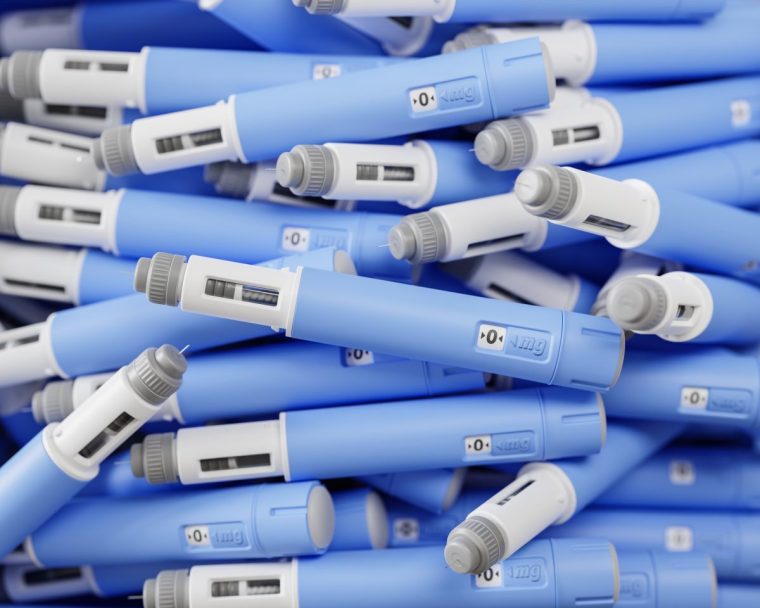The patent on weight loss injection semaglutide is due to expire in 2031, which will let other companies make cut-price versions of the same drug
Own-label versions of the weight-loss injection semaglutide may go on sale in six years’ time and could cost as little as £10 a month.
The medicine – sold as Wegovy for weight loss and Ozempic for diabetes – has limited NHS availability, so about 1.5 million people in the UK are currently buying it from online pharmacies, with prices ranging from £100 to £200 a month.
Cheaper “generic” versions of semaglutide cannot yet be made because of patents held by Danish manufacturer Novo Nordisk.
But when the main patent expires, in 2031, firms that make generic medicines are likely to seize the chance to make cut-price semaglutide. Online pharmacies would be able to drop their prices to consumers similarly.
The price could fall by up to 90 per cent, according to Robert Russell-Pavier, economics director of Medicines UK, which represents generics firms.
He said a large price fall is likely because there is such a big market for weight loss jabs. “When do you see such big price declines? It’s usually when there is a large market and so manufacturers can supply in economies of scale.”
By how much the price could drop
A similar prediction was given by Dr Rose Hughes, an attorney for pharmaceutical patent firm Evolve. “Normally you’d see a really dramatic fall as soon as there was any loss of the patent exclusivity,” she said.
However Daniel Chancellor, vice-president of pharmaceutical analysis firm Norstella, said the price drop may be less than usual because semaglutide is a large peptide molecule and so more complex to make than simpler, smaller molecules.
The potential market is so large because a quarter of adults in the UK are classed as obese, making them eligible to take semaglutide.
Another large fraction of the population would be eligible because, while not obese, they have a body mass index of 27 or over and have a medical condition such as high blood pressure.
Appetite for the medicines has also been growing as evidence has emerged showing they can reduce conditions such as heart attacks and strokes.
 When the patent for semaglutide expires, many firms may start making it (Photo: aprott/Getty Images/ iStockphoto)
When the patent for semaglutide expires, many firms may start making it (Photo: aprott/Getty Images/ iStockphoto)
Another factor likely to push down the price of generics is the number of companies competing in the market.
Given the large profits currently being made by Novo Nordisk, many such firms will already be planning their generic version, said Mr Chancellor. “Their pipeline is patent expiries. They have them mapped out 10, 20 years in the future,” he said. “The whole generics ecosystem will be vying to develop their own formulations.
Mr Russell-Pavier added: “One would have to expect lots of competition, and competition will bring the price down.”
A cut of the profits will still have to go to online pharmacies selling the medicines, many of which are partnering with online weight management firms, which use apps to give patients crucial advice on how to manage side effects and adjust their dose.
Generic forms of Mounjaro, a similar weight loss injection that is more potent than semaglutide, are likely to arrive in 2037.
Disputes between drug makers
There is uncertainty over the exact date when generic weight loss jabs will arrive, as big drug companies tend to lodge many patents relating to the same medicine – for instance in relation to dosing regimes or manufacturing processes – which are often challenged by generics firms.
“At the start of the drug development process, they would normally file on the active ingredient itself. And then as development occurs, and they say, ‘This is how we’ll administer it’, they’ll then seek to get further patents on those aspects,” said David Spinner, a patent attorney with Greaves Brewster.
Dr Hughes also wrote on a patent law blog this month: “The remarkable success of semaglutide means we can expect some high-profile intellectual property disputes.”
Professor Richard Donnelly, a metabolic medicine specialist at the University of Nottingham and adviser to Juniper, an online provider of the jabs, said: “Novo Nordisk have probably got an army of lawyers employed to defend patents around the manufacturing, so I am cautious about whether manufacturers will be allowed to generate generic semaglutide in [six] years’ time.”
But Novo Nordisk recently lost a case in the European Patent Office that would have extended its patent protection over the exact dose and chemical composition of semaglutide until 2033.
The challenge came from two generics firms, the Israeli company Teva and Spanish firm Galenicum Health, suggesting interest among the generics sector is growing.
Downward pressure on the price of semaglutide may also come from the arrival of an oral weight loss drug called orforglipron, said Prof Donnelly. “There’ll be a move to oral agents, which will bring the price down, because those drugs are far easier to produce.”
A spokesperson for Novo Nordisk said: “Patent expiry is a natural part of a pharmaceutical product lifecycle.
“We are committed to continued innovation and are exploring new molecules, combinations, and formulations of treatments to help improve the lives of people living with diabetes and obesity worldwide.”
